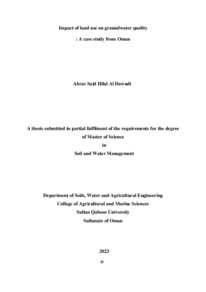Document
Impact of land use on groundwater quality : a case study from Oman.
Source
Master's thesis
Other titles
تأثير استخدام الأراضي على جودة المياه الجوفية : دراسة حالة في عمان
Country
Oman
City
Muscat
Publisher
Sultan Qaboos University
Gregorian
2023
Language
English
Subject
Thesis Type
Master's thesis
English abstract
Groundwater, a vital natural resource, is vulnerable to contamination due to human land use
practices. This study aims to comprehensively evaluate the impact of diverse land use types,
including urbanization, agriculture, industrial activities, and landfill on groundwater quality in
Oman. Using a combination of field sampling, laboratory analysis, statistical analysis, we
collected data over a two different period of time in one year from various wells across Muscat
government. Groundwater samples were analysed for key indicators of quality, including
salinity by measuring electrical conductivity, and vulnerability of groundwater aquifer.
Concurrently, the hydrological analysis of the samples was carried out by the seven parameter
consider by DRASTIC that classified the samples from land use in terms of their susceptibility
to human activities pollution. Our findings reveal significant variations in groundwater quality
across different land use zones. Urban and landfill areas demonstrated moderate contamination,
primarily attributed to storm water runoff and domestic sources. Agricultural regions exhibited
increased nitrate levels, linked to intensive fertilizer and pesticide application. Furthermore,
industrial land use displayed the most pronounced groundwater contamination, marked by high
concentrations of chemicals and industrial pollutants. Statistical analysis confirmed significant
correlations between the land use variables and groundwater quality indicators. Also,
DRASTIC model results proved that the land use practices has a clear role in increasing the
vulnerability of groundwater reservoirs in study areas to pollution, highlighting in the research
the direct influence of land use process on groundwater quality parameters. This study's results
not only highlight the complex interplay between land use and groundwater quality but also
provide valuable insights for policymakers and land planners. Recommendations for
sustainable land use practices, improved regulations, and targeted remediation efforts are
proposed to mitigate the adverse impacts on groundwater quality. Ultimately, this research
contributes to the broader understanding of the environmental consequences of land use
choices and underscores the importance of responsible land management in safeguarding our essential groundwater resources for current and future generations.
Arabic abstract
المياه الجوفية ، مورد طبيعي حيوي ، عرضة للتلوث بسبب ممارسات استخدام الاراضي البشرية. تهدف هذه الدراسة إلى تقييم شامل لتأثير أنواع استخدام الاراضي المتنوعة ، بما في ذلك التحضر والزراعة والانشطة الصناعية ومدافن النفايات على جودة المياه الجوفية في سلطنة عمان. باستخدام مزيج من أخذ العينات الميدانية ، والتحليل المختبري ، والتحليل الاحصائي ، قمنا بجمع البيانات على مدى فترتين مختلفتين من الزمن في عام واحد من مختلف الابار في جميع أنحاء محافظة مسقط. تم تحليل عينات المياه الجوفية لمؤشرات الجودة الرئيسية, بما في ذلك الملوحة عن طريق قياس التوصيل الكهربائي, وقابلية تلوث المياه الجوفية. في الوقت نفسه ، تم تعيين عينات بيانات استخدام الاراضي وتصنيفها لتقييم العلاقات والاتجاهات المكانية. تكشف النتائج التي توصلنا إليها عن اختالفات كبيرة في جودة المياه الجوفية عبر مناطق استخدام الاراضي المختلفة. أظهرت المناطق الحضرية ومناطق مدافن النفايات تلوثا معتدال ، يعزى في المقام الاول إلى جريان مياه الامطار والمصادر المحلية. أظهرت المناطق الزراعية زيادة في مستويات النترات ، مرتبطة بالتطبيق المكثف لألسمدة ومبيدات الافات. عالوة على ذلك ، أظهر استخدام الاراضي الصناعية تلوث المياه الجوفية الاكثر وضوحا، والذي يتميز بتركيزات عالية من المواد الكيميائية والملوثات الصناعية. أكد التحليل الاحصائي وجود ارتباطات كبيرة بين متغيرات استخدام الاراضي ومؤشرات جودة المياه الجوفية. كما أثبت أن ممارسات استخدام الاراضي لها دور واضح في زيادة تعرض خزانات المياه الجوفية في مناطق الدراسة للتلوث ، مع تسليط الضوء في البحث على التأثير المباشر لعملية استخدام الاراضي على معايير جودة المياه الجوفية. ال تسلط نتائج هذه الدراسة الضوء على التفاعل المعقد بين استخدام الاراضي وجودة المياه الجوفية فحسب ، بل توفر أيضا رؤى قيمة لصانعي السياسات ومخططي الاراضي. وتقترح توصيات بشأن ممارسات الاستخدام المستدام لألراضي ، وتحسين اللوائح ، وجهود الاصالح المستهدفة للتخفيف من الاثار السلبية على نوعية المياه الجوفية. في نهاية المطاف ، يساهم هذا البحث في فهم أوسع للعواقب البيئية لخيارات استخدام الاراضي ويؤكد على أهمية الادارة المسؤولة للأراضي في حماية موارد المياه الجوفية الاساسية للأجيال الحالية والمقبلة.
Category
Theses and Dissertations

